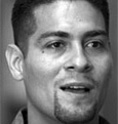 Juan Rivera On August 17, 1992, 11-year-old Holly Staker was raped and murdered while babysitting with two young children in Waukegan, Illinois. Ten weeks later, as a result of a tip from an informant, investigators began focusing on Juan Rivera, a 19-year-old former special education student, who had been convicted of a burglary and was on electronic home monitoring at the time of the murder.
Starting on October 26, detectives questioned Rivera for four days, while he denied any knowledge of the crime. At the end of the fourth day, around midnight, after the interrogation became accusatory, he broke down, and purportedly nodded when asked if he had raped and killed Staker.
The interrogation continued until 3:00 a.m., when investigators left to type a confession for Rivera to sign. Minutes later, jail personnel saw him beating his head against the wall of his cell in what was later termed a psychotic episode. Nevertheless, within a few hours, Rivera signed the typed confession that the investigators had prepared. The document, a narrative account of what the investigators claimed Rivera told them, was so riddled with incorrect and implausible information, that Lake County State’s Attorney Michael Waller instructed investigators to resume the interrogation in an effort to clear up the inconsistencies. On October 30, despite Rivera’s obvious fragile mental condition, the interrogation resumed, resulting in a second signed confession, which contained a plausible account of the crime.
The jury trial began on November 1, 1993, with the prosecution’s case based primarily on the second confession. On November 19, the jury found Rivera guilty and the prosecution asked for a death sentence. The jury rejected it, and Judge Christopher C. Starck, a month later, sentenced Rivera to life in prison. On November 9, 1996, the Illinois Appellate Court reversed the conviction based on the cumulative effect of trial errors and remanded the case for a new trial.
On September 16, 1998, Rivera’s second jury trial began. Again, the prosecution primarily relied on the second confession. But, it also produced an eyewitness to the murder who identified Rivera as the man who stabbed Staker. The witness, Taylor Englebrecht, was one of the two children for whom Staker was babysitting when she was attacked and was just two years old at the time. Furthermore, the results of the polygraph examination were admitted at trial, but the defense was barred from asking questions that would make it clear that the deception indicated by the polygraph did not implicate Rivera in the crime. On October 2, after deliberating 36 hours over four days, the jury found Rivera guilty, and Judge Starck again sentenced Rivera to life in prison. On December 12, 2001, the Illinois Appellate Court affirmed the second conviction.
On May 24, 2005, DNA tests eliminated Rivera as a source of the semen recovered from Staker’s vagina. On August 29, 2006, Judge Starck himself vacated Rivera’s conviction and ordered a third trial. Despite the DNA exclusion, Waller chose to retry the case.
On April 13, 2009, Rivera’s third jury trial began, again under Judge Starck. Assistant State's Attorney Michael Mermel discounted the exculpatory DNA evidence, suggesting that Staker, at age 11, was sexually active, and DNA found at the scene was not that of her killer. He also suggested that the DNA might be Rivera's, but was compromised by lab technicians. On May 8, the jury found Rivera guilty, despite the exculpatory DNA evidence. On June 25, 2009, Judge Starck sentenced Rivera to life in prison for the third time.
Lawrence C. Marshall, Stanford University Law Professor, and co-founder of the Center on Wrongful Convictions, was the lead attorney for the appeal of Rivera’s third conviction. He was joined by co-counsel from Jenner & Block LLP and the Center. Among the issues raised on appeal were whether the evidence had been sufficient to prove guilt beyond a reasonable doubt, whether Rivera had been denied his right to present a defense when Starck refused to allow his attorneys to present evidence rebutting the false claim of the police that Rivera knew facts only the perpetrator would have known, and whether Rivera’s confessions should have been suppressed on the ground that they were involuntary.
On December 9, 2011, the Illinois Appellate Court ruled that Rivera’s conviction was “unjustified and cannot stand,” and on January 6, 2012, Waller announced that the State would dismiss the charges. Waller told the press that, “Today, I believe the right thing is to bring to a conclusion the case against Mr. Rivera by electing not to appeal the reversal of his conviction.” Juan Rivera had served 20 years in prison.
Rivera received a certificate of innocence and $213,600 in state compensation. In October 2012, he filed a federal wrongful conviction lawsuit against Lake County law enforcement officials alleging they framed him. The lawsuit was settled in March 2015 for $20 million--the largest such settlement in Illinois history.
— Rob Warden
|